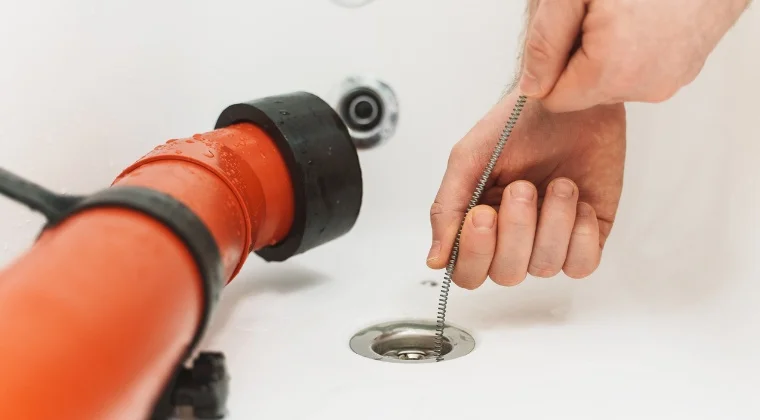
Best Way to Unclog Drain
When you're dealing with a tough clog in your drain, figuring out the best way to fix it can be tricky.
You should always start with the simplest methods and move on to more complex solutions if needed.
If you've tried the basic fixes and they're not working, don't worry.
We will explore some less common but effective ways to get your drain flowing smoothly again.
Key Takeaways
- Use a plunger for solid suction force and tight seals.
- Try a homemade baking soda and vinegar solution.
- Consider using a drain snake for flexible reach.
- Opt for a chemical drain cleaner as a last resort.
- Contact a professional plumber for persistent clogs.
Identify the Clog Location
To effectively address a clogged drain, the initial step is to pinpoint the exact location of the obstruction using simple techniques like visual inspection or a plumbing snake. Clog detection is vital in determining the most effective method for unclogging the drain.
Begin by examining the drain opening for any visible blockages such as hair, soap scum, or food particles. If nothing is immediately visible, a plumbing inspection camera can be inserted into the drain to locate the blockage accurately.
Remove Visible Debris From Drain
Start by visually inspecting the drain opening for any visible blockages such as hair, soap scum, or food particles. Use a drain strainer to catch debris before it enters the drain to prevent clogs in the future. If you notice any visible debris, remove it manually using gloves or tweezers.
Hair removal tools like drain snakes can be effective for hair clogs. Once you have removed the visible debris, run hot water down the drain to help clear any remaining residue.
| Visible Debris Removal | Tools Needed |
|---|---|
| Inspect drain opening | Gloves |
| Use drain strainer | Tweezers |
| Manual removal | Drain snakes |
Use a Plunger to Unclog
Utilize a plunger to effectively clear clogs in your drain by creating a strong suction force. When using a plunger, make sure you cover the drain completely and push and pull with force to dislodge the blockage. This technique helps to build up pressure, loosening the clog and allowing water to flow freely again.
It's important to use the right type of plunger for the job. Cup plungers are suitable for sinks and flat surfaces, while flange plungers are best for toilets due to their extra piece that fits into the drain opening.
Common mistakes when using a plunger include not covering the entire drain opening, using the wrong type of plunger, or not plunging with enough force. To optimize the effectiveness of the plunger, ensure you have a tight seal and apply vigorous pressure during the plunging motion.
Try a Homemade Baking Soda Solution
When facing a clogged drain, consider trying a homemade baking soda solution. This method offers a range of benefits, such as being a simple do-it-yourself remedy that's both effective and environmentally friendly.
Baking Soda Benefits
To harness the benefits of baking soda effectively, consider creating a homemade solution to tackle drain clogs. Baking soda is a versatile ingredient that can help clear drains naturally without harsh chemicals.
Here are some benefits of using baking soda for unclogging drains:
- Diverse: Baking soda is a safe and non-toxic alternative to chemical drain cleaners, making it eco-friendly and gentle on your pipes.
- Odor Eliminator: It not only helps clear clogs but also eliminates unpleasant odors that may be lingering in your drains.
- Cost-effective: Baking soda is an affordable option for maintaining your drains regularly, saving you money in the long run.
- Versatile Cleaning Agent: Apart from unclogging drains, baking soda can be used for a variety of cleaning tasks around the house, making it a multi-purpose cleaning agent.
Easy DIY Solution
Consider incorporating a homemade baking soda solution to effortlessly tackle drain clogs and maintain a clean plumbing system. This easy do-it-yourself solution can be a game-changer when dealing with minor blockages.
To start, pour about half a cup of baking soda down the drain, followed by half a cup of vinegar. The mixture will fizz, helping to break down any organic materials causing the clog. Let it sit for at least 30 minutes, allowing the solution to work its magic.
Afterward, flush the drain with hot water to wash away the loosened debris.
Environmentally Friendly Option
For an environmentally friendly approach to unclogging drains, utilizing a homemade baking soda solution can be a highly effective and eco-conscious choice. Baking soda, also known as sodium bicarbonate, is a natural alternative to harsh chemicals often found in commercial drain cleaners.
Here's how you can create your eco-friendly drain cleaner using baking soda:
- Baking Soda and Vinegar: Combine 1/2 cup of baking soda with 1/2 cup of vinegar. Pour the mixture down the drain, let it sit for about 30 minutes, then flush with hot water.
- Baking Soda and Salt: Mix 1/2 cup of baking soda with 1/2 cup of salt. Pour the blend down the drain followed by boiling water to dissolve the clog.
- Baking Soda and Lemon Juice: Create a paste using baking soda and lemon juice. Apply it to the drain, let it sit for an hour, then rinse with hot water.
- Baking Soda and Hot Water: Simply pour 1 cup of baking soda down the drain, followed by 3 cups of hot water to help break down grease and grime.
These eco-friendly products offer a safe and efficient way to keep your drains clear while being mindful of the environment.
Vinegar and Hot Water Method
Using a mixture of vinegar and hot water can be an effective method for unclogging drains. Vinegar's benefits lie in its cleaning power, as it can break down buildup and debris in the pipes. When combined with hot water, the effectiveness is increased due to the heat helping to dissolve greasy substances that may be causing the blockage.
- To utilize this method, start by pouring a pot of hot water down the drain to help loosen the clog.
- Follow this by pouring a mixture of equal parts vinegar and hot water down the drain.
- Let it sit for about 30 minutes to allow the solution to work on breaking down the blockage.
- Lastly, flush the drain with hot water again to wash away the loosened debris.
Utilize a Drain Snake
To effectively clear a stubborn clog in your drain, consider utilizing a drain snake. A drain snake, also known as a plumbing snake or auger, is a flexible tool that can help break up and remove clogs deep within your pipes.
Here are some key points to keep in mind when using a drain snake:
- Snake Alternatives: If a drain snake isn't available, you can try using a wire coat hanger or a drain cleaning solution to help dislodge the clog.
- Maintenance Tips: After using a drain snake, flush the drain with hot water to remove any remaining debris and prevent future clogs.
- Snake Safety: Always wear gloves and eye protection when using a drain snake to avoid any splashes or debris.
- Professional Help: If you're uncomfortable using a drain snake or the clog persists, consider seeking help from a professional plumber who can safely and effectively clear the blockage. Remember, safety foremost!
Prevent Future Clogs With Maintenance
To maintain a clear and functioning drain system, it is crucial to implement preventative measures that can help avoid future clogs and blockages. Regular maintenance is key to ensuring your drains remain free of obstructions.
By incorporating simple preventative measures into your routine, you can save yourself the hassle of dealing with stubborn clogs down the line. Here are some effective tips to prevent future clogs:
| Preventative Measure | Frequency | Description |
|---|---|---|
| Flush with Hot Water | Weekly | Pouring hot water down the drain helps dissolve grease and soap buildup, preventing blockages. |
| Use Drain Strainers | Monthly | Installing drain strainers catches hair, food particles, and debris, preventing them from clogging pipes. |
| Regular Inspections | Bi-Annually | Check for any signs of slow drainage or strange odors to catch potential issues before they worsen. |
Frequently Asked Questions
Can I Use Chemical Drain Cleaners to Unclog Drains?
You should consider alternative solutions for unclogging drains. Chemical cleaners pose risks to pipes and health. It's advisable to seek professional help or try safe DIY methods like using a plunger or a drain snake initially.
How Do I Prevent Hair Clogs in the Shower Drain?
To prevent hair clogs in the shower drain, start by using drain strainers or a hair catcher. These tools will trap hair and prevent blockages. Regular maintenance, such as cleaning the strainers, can help keep your drain flowing smoothly.
Is It Safe to Use a Drain Snake on All Types of Pipes?
When considering pipe compatibility, it's crucial to be cautious with drain snakes. Not all pipes are suitable for this tool. Safety concerns arise when using a drain snake on fragile or old plumbing, potentially causing damage.
Final Thoughts
By following these easy steps and using the correct tools, you can successfully clear a clogged drain in your home. It's important to keep your drains clean and avoid putting things that could cause blockages down them.
If you're looking for a bit of expert help, our team at Berkeley Plumbing Pros is always ready to step in. We specialize in making sure your drains stay clear, covering Berkeley and the surrounding areas. Give us a call at (877) 959-6069 if you need professional assistance.
With some knowledge and effort, you can keep your drains running smoothly and steer clear of the hassle of a blocked pipe.

